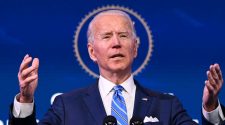BERLIN — Is she really OK?
All of Germany is asking itself that question following Angela Merkel’s latest bout of tremors — the chancellor’s third such spell in public over the past three weeks.
Though she has consulted doctors about the cause and undergone testing, Merkel has yet to release the results or provide any further detail. On Thursday, during an official ceremony to welcome Denmark’s new prime minister, both leaders broke with standard protocol to sit on chairs that had been placed on the red carpet in front of the chancellery.
Merkel’s attempts to downplay the episodes by insisting that she’s “very well” have only heightened Germans’ worry, prompting a more fundamental question in the privacy-obsessed country: Does the public have a right to know more about her condition?
Merkel certainly doesn’t think so.
Were Merkel to fall seriously ill, the international implications would be significant.
“I think my statement that I’m doing well will be accepted,” she told reporters after her shaking spell on Wednesday, adding, “I think it will recede as quickly as it appeared.”
Though Merkel insists she’s fit to work, she has offered only sparse detail about what is ailing her. That worked at first, but her latest attack is forcing the country to reexamine the firewall it has maintained for decades between the public and private lives of its politicians.
Merkel is widely considered the most important leader in Europe, a fact that makes the state of her health an important issue well beyond her country’s borders.
Were she to fall seriously ill, the international implications would be significant. Legally, she could be replaced in short order by any German over the age of 18 who could muster a majority in the Bundestag, the German parliament. Practically, the exit of the woman Germans refer to only half in jest as Mutti (“Mom”) would be a massive jolt.
Annegret Kramp-Karrenbauer is Merkel’s choice to succeed her as chancellor | Christof Stache/AFP via Getty Images
With questions swirling about the suitability of her chosen successor, Annegret Kramp-Karrenbauer, the chancellor’s sudden departure would almost certainly unleash a period of chaos. There’s no guarantee Germany’s governing coalition would hold, for example, forcing a new election that — if current polls are to be believed — would upend Germany’s political landscape with profound implications for all of Europe.
Given how much is at stake, Merkel’s attempt to avoid scrutiny and draw a line under the issue seems tenuous at best.
That’s particularly true considering that a reputation for an iron constitution has been central to her political persona. For years, she has usually been the last person standing after one of Europe’s notorious marathon summit meetings, appearing positively chipper as she fields questions from bedraggled members of the press corps in the small hours.
That was true once again last week, when the chancellor spoke to the press after a two-day marathon negotiating session over the next Commission president that came immediately on the heels of a G20 meeting in Japan.
But after 14 years in office has Merkel, who turns 65 next week, pulled one all-nighter too many?
Truth be told, no one really knows. There’s no shortage of theories in the German press over what could be causing Merkel’s tremors, from Kreislaufprobleme (a peculiar German obsession loosely translated as “circulation problems” that is blamed for a wide array of discomforts) to just stress.
“The silence, the attempts to brush it all off, are no longer tenable” — Tabloid newspaper Bild
What is clear is that Merkel has had a punishing schedule since the tremors began.
She attributed her first bout of the shakes — which came during a ceremony to welcome Ukraine’s new president on June 18 — to the heat in Berlin. She explained that she hadn’t drunk enough water.
Since then, it’s cooled down considerably in the German capital. Her second episode occurred on June 27, just before she flew to Osaka, while she was standing indoors alongside German President Frank-Walter Steinmeier. Merkel suggested afterwards that the cause may have been psychosomatic, triggered by worry over the first incident.
On Wednesday, after the third bout, she hinted again at a psychological cause, saying she was still “processing” the first episode.
Many German commentators are alarmed by the prospect the country’s leader could be suffering psychological duress, but the issue is a political hot potato.
After Hans-Georg Maaßen, the controversial former head of Germany’s domestic intelligence service, tweeted on Thursday that “the health condition of a government leader is not a private matter,” he was roundly castigated.
“Herr Maaßen, you should be ashamed of yourself,” thundered Renate Künast, a prominent Green.
For the most part, German media have also treaded lightly on the question of Merkel’s health.
On Wednesday’s edition of public television’s Tagesschau, the most-watched news show in Germany, a brief report on Merkel’s shakes was just the sixth item on the 15-minute program.
Conservative daily Frankfurter Allgemeine Zeitung carried the story as a brief at the bottom of its front page Thursday. (The paper’s main page-one story concerned President Steinmeier demanding more public support for politicians who face abuse.)
Tabloid Bild (owned by POLITICO Europe co-publisher Axel Springer) was one of the few papers to hit the story head on.
“It simply won’t stop!” the paper screamed across its front page, next to a photograph of Merkel pursing her lips during her latest shaking spell.
“The silence, the attempts to brush it all off, are no longer tenable,” the paper concluded.


















